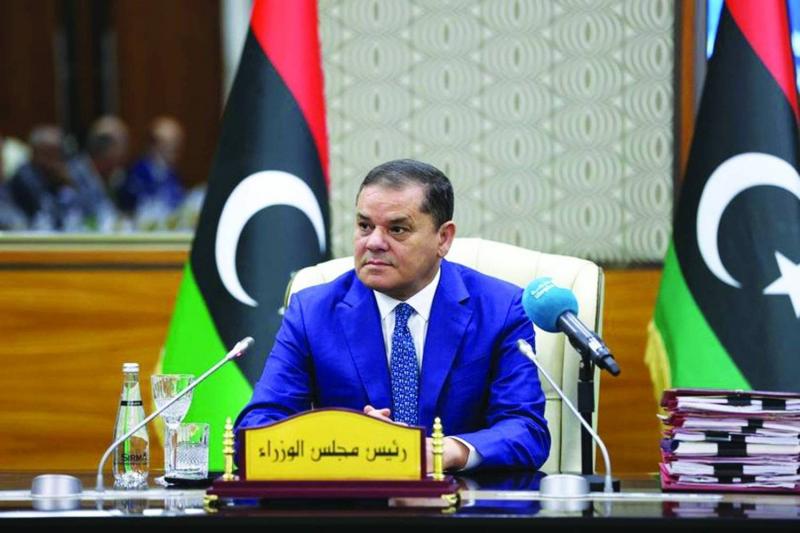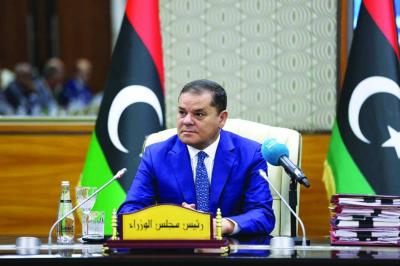The outgoing Prime Minister of the Government of National Unity, Abdulhamid Al-Dbeiba, continues to indulge in his favorite pastime of balancing interests, attempting to gain the approval of all parties involved in the Libyan issue, despite their differing perspectives and often contradictory agendas. His main concern is to ensure his survival in power, a position he reached amid corruption suspicions and widespread doubts through the political dialogue forum in February 2021.
Earlier this month, Al-Dbeiba visited Cairo to participate as the Foreign Minister in the "Second Regional Review of the Global Compact for Safe, Orderly, and Regular Migration in the Arab Region" organized by the Arab League, the International Organization for Migration, and the United Nations Economic and Social Commission for Western Asia (ESCWA). He attempted to utilize this visit to restore ties with Egyptian leadership, which had become strained since his last visit in September 2021. During that visit, he made a significant political and diplomatic error by allowing his team to leak a recording of his meeting with Egyptian Prime Minister Mustafa Madbouly, which was seen as a breach of meeting protocols and raised many questions about the motives behind such actions.
The Egyptian government felt shocked by the recording of the closed discussions led by Abdulhamid Al-Dbeiba, considering the act to be unworthy of statesmen due to its violation of diplomatic norms. They emphasized that trying to gain popularity at Egypt's expense and compromising the reputation and confidentiality of its officials was utterly unacceptable.
After this mishap, Al-Dbeiba hesitated to visit Cairo until he was invited by the Arab League, which he attempted to use as an opportunity to normalize his relations with the Egyptian authorities. It became clear that the Egyptian side had not forgotten the leak and had not forgiven Al-Dbeiba for breaking protocol, to the extent that President Abdel Fattah El-Sisi did not greet him as he usually would when a Prime Minister from any country visited Cairo, delegating the responsibility to the Prime Minister for the customary hospitality.
During discussions with Madbouly, Al-Dbeiba touched on cooperation opportunities and activating agreements between the two countries, agreeing to provide the necessary support to Egypt in the electricity sector to stabilize the national grid and to activate the electrical interconnection between the two nations. They also discussed the implementation of a national wastewater project initiated by the Libyan unity government, drawing upon Egypt's experience in this critical area.
The outcomes of the Egyptian-Libyan high-level committee meetings held in Cairo in 2021 were reviewed, and the coordination of the next meeting aimed at enhancing cooperation and boosting investments was discussed. They considered supporting the private sectors in both countries and holding exhibitions and conferences to showcase Egyptian and Libyan industries, and forming an Egyptian-Libyan Business Council under the supervision of both governments to provide necessary support.
Al-Dbeiba sought to use his visit to Cairo as an opportunity to win over the Egyptian side, which plays a significant role in the Libyan file, and to ensure its neutrality regarding the renewal of executive authorities, backing the Libyan Parliament's call for the formation of a unified government as a prerequisite for moving toward long-awaited elections. However, the Egyptians are well aware of Al-Dbeiba's intentions and the pragmatic political background he stems from, recognizing his pro-Turkish inclinations and the fact that he is relying on those who display animosity toward Egypt, including the Head of the Fatwa House in Tripoli, Sadik al-Ghariani, the political Islam movement, and warlords associated with him, leading up to the Muslim Brotherhood lobby that dominates the decision-making in the State Council, headed by Muhammad Takala, who sought to exploit the ongoing conflict with the Parliament over the state budget to announce his boycott of the planned tripartite meeting with Aguila Saleh and Muhammad al-Mnifi in Cairo, leaking justifications regarding the Egyptian intelligence's intervention in guiding the discussions.
In contrast, Al-Dbeiba also held talks last Sunday with the Turkish Chief of General Staff, Metin Gurak, regarding conducting joint military exercises. A statement from his media office indicated that the meeting included programs for cooperation between the General Staffs of both countries and several training programs and joint military maneuvers between their defense ministries, which many analysts see as reinforcing not only Turkey's military presence in western Libya but also Ankara's role in maintaining the status quo, particularly regarding the continued functioning of Al-Dbeiba's government indefinitely.
While Al-Dbeiba has an open window with Moscow, his relations with the United States have become an important part of Washington's strategy to curb Russian expansion, as he has the capability to convince the Americans that he is an ally they can rely on, while also persuading the Russians that he is the most capable of ensuring their interests.
Al-Dbeiba may be justified in utilizing the tightrope strategy to ensure positive outcomes in navigating the vast complexities surrounding him. However, he must beware of the changes that could happen at any moment, especially if the interests of influential countries converge against him, considering him a scapegoat for their strategic or geopolitical agendas. The landscape is susceptible to dramatic changes, and leaders who currently offer him friendship, support, and favor may dismiss him if they find that their interests lie elsewhere.
One might ask: Al-Dbeiba's interests with whom? The answer could be with everyone for the sake of remaining in power, while the only party that is disregarded in this equation is the Libyan people, who did not bring him to power and have not found suitable opportunities to voice their opinions, possibly not finding them in the foreseeable future as long as the engineer excels at tightrope walking.




